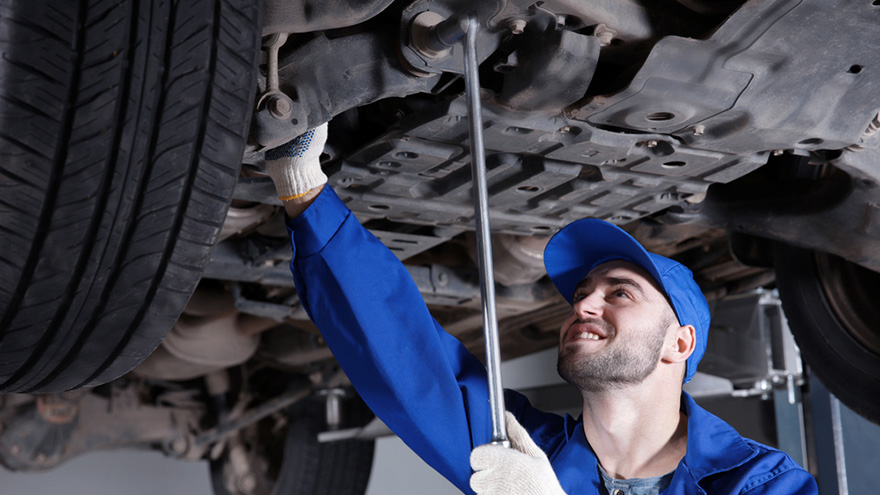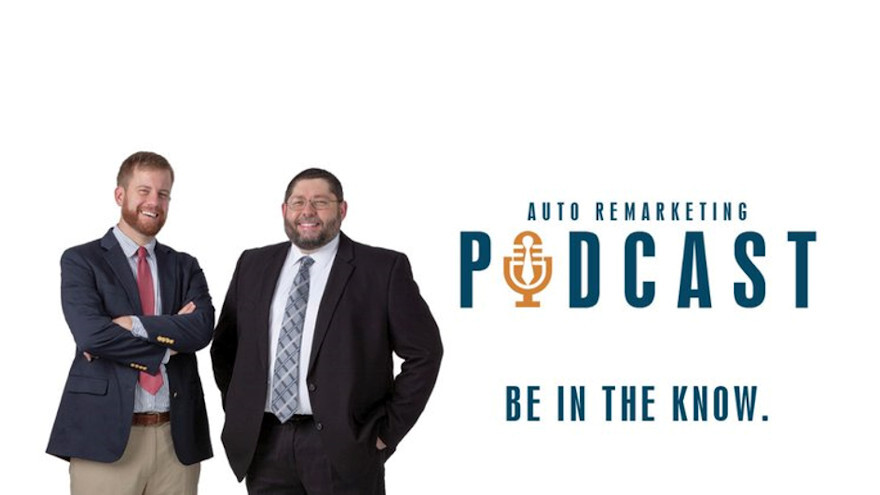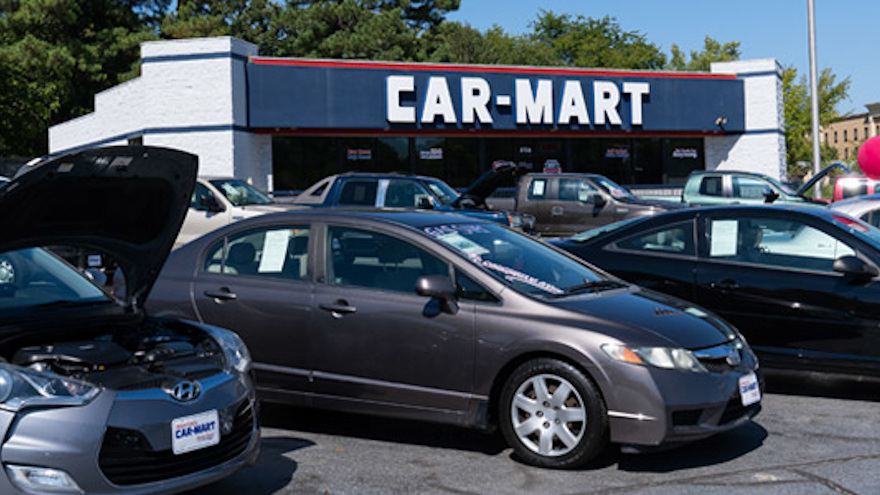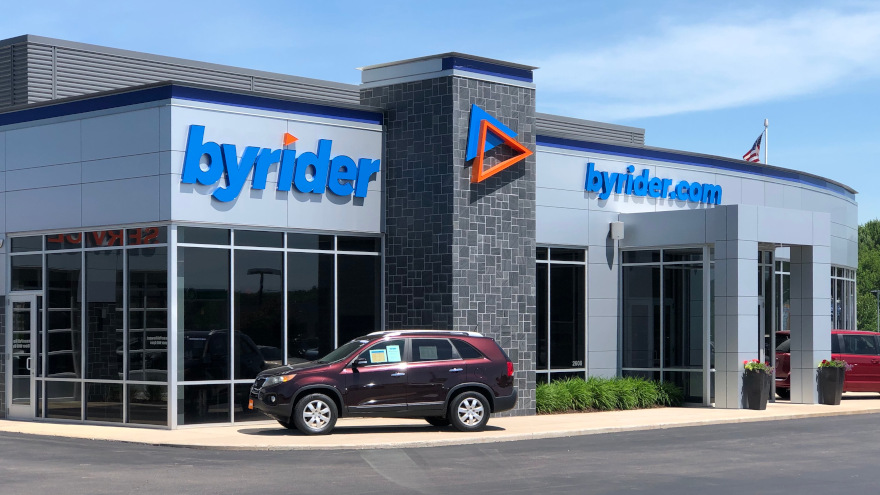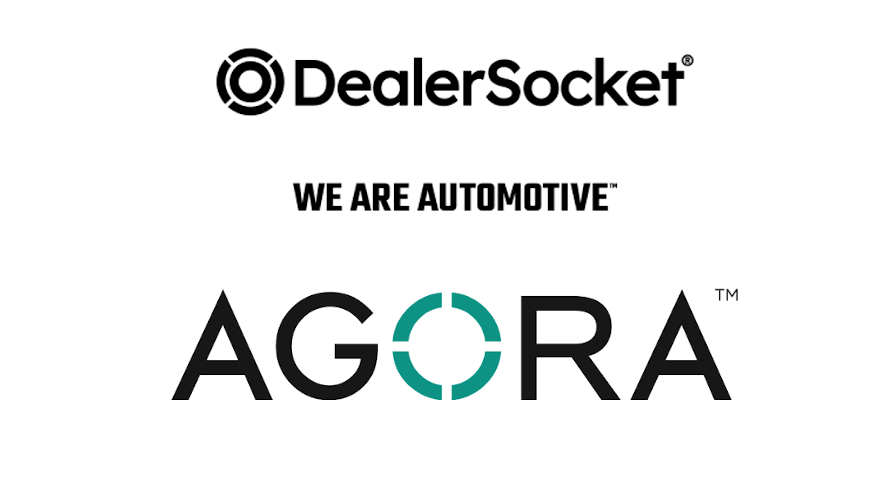America’s Car-Mart recently marked the opening of its 150th dealership in one of the largest markets in Tennessee.
On the last sales day of July, the chain of buy-here, pay-here dealerships began retail operations in Chattanooga, Tenn. The location is Car-Mart’s seventh dealership in Tennessee and the second store opening of its 2021 fiscal year.
The company said the dealership will be managed by Char Green with the assistance of Heather Horne. This will be the second dealership managed by Green as Car-Mart indicated it’s looking to expand the number of customers served by top-performing general managers.
“A great deal of thought and foresight is placed on our decisions about where to grow. We select communities where we believe we can fill a void when it comes to what we offer at Car-Mart,” president and chief executive officer Jeff Williams said in a news release.
“We’re different from traditional dealerships. In addition to providing quality used vehicles, we also provide financing and exceptional service after the sale,” Williams continued. “We are committed to providing peace of mind for our customers and we believe communities are better when we are there.”
This Chattanooga dealership is located at 5701 Ringgold Road.
“We’re excited about joining the Chattanooga community. It’s a growing area with a lot of potential,” Green said.
“At Car-Mart, we offer a unique buying process for our customers where it’s not just a purchase, but an experience,” she went on to say. “We get to know our customers and work closely with them on flexible financing that meets their needs and budgets.”
Results of a July survey orchestrated by LendingTree found the depth consumers are putting off vehicle repairs because of tightened household budgets stemming from the coronavirus pandemic, including some figures of individuals who could be buy-here, pay-here dealership customers.
The findings reiterated why GWC Warranty offers dealerships tools to help market and promote the potential value of a vehicle service contract.
LendingTree discovered consumers of color currently are disproportionately dealing with debt due to vehicle trouble. The online marketplace found Black American (59%), Hispanic American (52%) and Asian American (47%) vehicle owners have been in auto repair debt at higher rates than white Americans (38%).
All told, LendingTree determined about 28% of Americans would not be able to cover a $500 vehicle repair without taking on debt. The company learned through the survey that’s especially true for Black Americans (39%), those who were laid off due to the COVID-19 pandemic (34%) and women (32%).
Meanwhile, nearly six in 10 survey participants (58%) have skipped a necessary vehicle repair because they couldn’t afford it, including 71% of millennials.
Furthermore, LendingTree discovered about one in six (16%) consumers would not be able to get to work if their vehicle broke down. That number spikes to 30% for those individuals earning less than $25,000 per year, according to the survey.
Finally, LendingTree said people whose income was affected by the pandemic are struggling with debt from vehicle trouble. About a third (35% of those who were furloughed and 30% of those whose salary or hours were cut) have been in debt for that reason since March, versus 11% whose income was not impacted.
“While it’s ideal to pay for car repairs in cash, not all consumers have that kind of money stowed away in an emergency fund,” LendingTree said in a news release.
Enter firms such as GWC Warranty, which offers F&I products like vehicle service contracts. GWC Warranty has promotional material that can be downloaded here that show potential costs of major vehicle repairs that often can be covered by a VSC.
“It’s exciting when your customer gets behind the wheel for the first time, and the last thing they want to think about is what may happen a few years down the road — or even just on the way home. But the reality is that as soon as buyers drive off the lot, there’s no telling what’s around the corner,” GWC Warranty said in a recent company blog post.
“Aside from the routine maintenance and wear and tear they may already be factoring into the cost of ownership like oil changes and the occasional flat tire, unexpected costs like a major engine repair, air conditioning replacement, and labor that goes along with it can really add up,” the company continued.
“Be prepared to educate your customers during the buying process so they’re aware of what the cost of ownership can add up to beyond a monthly payment,” GWC Warranty went on to say.
Texas Independent Automobile Dealers Association executive director Jeff Martin joined senior editor Nick Zulovich for a conversation about how operators in the Lone Star State are faring during the coronavirus pandemic.
Martin also recapped how TIADA is making adjustments to modify its popular summertime conference to a digital format.
To listen to the episode, click on the link available below, or visit the Auto Remarketing Podcast page.
Download and subscribe to the Auto Remarketing Podcast on iTunes or on Google Play.
America’s Car-Mart is looking to show that COVID-19 won’t deter the chain of buy-here, pay-here dealerships. Coming off a new company record for annual revenue, Car-Mart opened another dealership on Monday after beginning the current fiscal year by relocating its corporate headquarters.
Now based in Rogers, Car-Mart currently operates 149 dealerships after opening the 38th location in its home state of Arkansas. The store in Cabot is to be managed by Dennis Johnson with the assistance of Chris Martin.
“A great deal of thought and foresight is placed on our decisions about where to grow. We select communities where we believe we can fill a void when it comes to what we offer at Car-Mart,” president and chief executive officer Jeff Williams said in a news release
“We’re different from traditional dealerships. In addition to providing quality, used vehicles we also provide financing and exceptional service after the sale,” Williams continued. :We are committed to providing peace of mind for our customers and we believe communities are better when we are there.”
Cabot is situated less than 30 miles northeast of Little Rock, the capital of Arkansas. This new dealership is located at 177 Arena Road.
“We’re excited about joining the Cabot community. It’s a growing area with a lot of potential,” Johnson said. “At Car-Mart, we offer a unique buying process for our customers where it’s not just a purchase, but an experience. We get to know our customers and work closely with them on flexible financing that meets their needs and budgets.”
Recent annual performance and pandemic-related financial actions
Car-Mart reported that revenue for its 2020 fiscal year came in at a new record of $196 million. The company said it retailed 52,914 vehicles during the fiscal year that ended April 30, representing a 5.3% lift year-over-year.
Chief financial officer Vickie Judy explained several movies Car-Mart made to “ensure financial flexibility during this unprecedented time.” In a news release, Judy noted that the company took a $30 million draw on its revolving credit facility and significantly reduced expenses during the last half of the fourth quarter, including part-time and hourly payroll as well as other non-associate related expenses.
As a result of these efforts, Judy said Car-Mart closed its fiscal year with a cash balance of $59.6 million and its debt, net of cash, to finance receivables stood at 25.1%, compared to 27.8% the end of the prior fiscal year.
“We have also taken advantage of deferring the employer share of Social Security payroll taxes as permitted under the CARES Act,” Judy said. “Although we reduced hours for certain associates, we are happy to say these measures have allowed us to maintain workforce engagement with no disruption to associate benefits.
Judy also mentioned Car-Mart increased its allowance for credit losses from 24.5% to 26.5% resulting in an $11.7 million pre-tax charge to the provision in the fourth quarter.
“For the safety of our customers and associates, we suspended certain collection activities, including personal visits and repossession efforts, for a period of time during the pandemic,” Judy said. “This resulted in a lower amount of net charge-offs as a percent of average finance receivables for the quarter.
“However, COVID-19 has impacted our customers and resulted in increased past-due amounts as a percentage of receivables, resulting in uncertainty of how customers pay and react in this new environment,” she continued. “We are very focused on working with our customers to keep them in their vehicle and on the road.”
Moves to keep retail activities in motion
To keep dealerships active, Williams also highlighted that Car-Mart launched curbside and home delivery as a result of the COVID-19 pandemic. He mentioned the company also increased its digital efforts, “which included expanding communications channels with our customers to ensure they know how much we care about them individually.”
Williams said, “In our nearly 40 years of business, we have weathered many storms, but through them all, we were steadfast in our focus on the customer experience, ‘Keeping our Customers on the Road and giving them Peace of Mind.’ Our commitment to our customers has never been stronger, and during these challenging times, we moved even closer to our customers and united together as a family. We are a small-town character lender and really stepped up and walked the walk by truly living out our company’s mission, vision, and values in our daily work.
“Our company has most certainly prioritized the safety and well-being of our associates and customers during the pandemic. We will continue to be diligent and aggressive in educating ourselves and our team members on ways to help prevent or reduce the risk of exposure to the virus,” Williams went on to say.
The Car-Mart leader also touched on the performance of the company’s staff and dealership personnel during the pandemic.
“Words can’t express how proud I am of our associates, and how our team continues to rise to the occasion in the face of maybe the greatest healthcare crisis and most certainly the largest financial disruption in the history of our country,” Williams said. “The fact that we deeply understand our company’s purpose is carrying us through this crisis and will set a firm foundation for us to continue our path of serving more customers with great vehicles and excellent customer service.
“Thank you to our Car-Mart associates for taking care of each other and our customers, and for improving the communities in which we do business,” he continued. “I am grateful for the hard work, dedication, and compassion of our associates. Their caring and compassion is making a real difference in the lives of so many good people facing increased financial and personal challenges in these trying times. I am in awe of the great people we have in this company and I am humbled to be part of the team.”
Details of new company headquarters and future investment
And at least part of that Car-Mart team will be completing its tasks in a new workplace.
Just before after Memorial Day, Car-Mart relocated its corporate office from Bentonville to a larger facility in Rogers to accommodate continued business growth. The new office is located at 1805 N. 2nd Street in the Benchmark Group Building.
“This move represents a significant milestone in the growth and evolution of our company,” Williams said. “We’re growing and we need a bigger space to accommodate our associates, and to foster a more productive work environment.
“For the first time in a long time, we will have all of our corporate associates in the same facility,” Williams continued. “This move will allow us to be more efficient and better serve our dealerships and our growing customer base. The new location features improved workspaces that will help to facilitate internal and external collaboration and communication. We’re excited to join the Benchmark Group in their beautiful building and to be a part of downtown Rogers.”
Judy pointed out how Car-Mart made this move without damaging its financial statement. She said the company finished 2020 fiscal year ended by adding $77.9 million in receivables, a repurchased $16.0 million of its common stock, and funded $5.5 million in net capital expenditures, a total of $99.4 million, with only a $4.8 million increase in debt net of cash.
“We will continue to remain focused on cash-on-cash returns and maintaining a strong balance sheet,” Judy added.
Furthermore, Williams mentioned some of the other investment paths Car-Mart might take.
“We will keep investing in our business, including recruiting, training, and retention of quality associates. We will be diligent in improving our operations, with significant emphasis on our vehicle inventory. And we will put a laser focus on delivering an exceptional customer experience. That is why we believe our company’s future is very bright,” Williams said.
“We expect disruptions in the consumer credit markets and in-vehicle supply channels to present positive opportunities for our business and we intend to be ready to leverage our position moving forward. As we have said, we believe that most of our dealerships can serve 1,000 or more customers over time and we have significant opportunities to gain market share from our existing locations,” he continued.
“In addition, new lot openings and strategic acquisitions are expected to be part of our plan as we move forward. The market we serve is large and our growth will be at a rate that aligns with our ability to serve our customers after the sale at the highest level of service,” he went on to say.
On July 1, 1941 at 2:29 p.m., the first television commercial appeared on screens across the United States. Bulova, a watch company, aired their 10-second commercial at a cost of $9 prior to a Brooklyn Dodgers and Philadelphia Phillies baseball game.
During the last Super Bowl, companies paid $5.6 million for a 30-second spot. Just under 100 million viewers on average watched Fox’s broadcast of the game.
Video was exclusive to television in 1941 but obviously it is not any longer. The delivery of video has grown because of the internet and sites like YouTube. It’s led to $26 million in earnings for 8-year-old Ryan Kaji, last year’s top YouTube earner with $26 million. Ryan rose to fame opening presents in front of the camera. Ryan Toys Review debuted in 2015 and now has 23 million subscribers.
A lot has changed since July 1, 1941. What has not changed — video is powerful.
Some advertisers have cut back on television ads because of other available delivery systems, not because video stopped working. Less expensive and more targeted distribution has allowed additional genres and the “average person” to “be seen.”
Video can be engaging. A person’s personality comes through in a video more than other delivery mechanisms. Video is closer to real life because you can see and hear the person delivering the message—which makes it easier to trust the messenger (or advertiser). A video can make a difficult topic easier to understand.
If a picture is worth a thousand words, what is a video worth?
Thankfully for advertisers, you don’t have to spend $5.6 million on a Super Bowl ad to reach 100 million viewers. In fact, PragerU.com has earned 3.1 billion views of their videos in just a few years.
The style of video matters as does the delivery mechanism
Earlier this year I interviewed Dennis Prager, founder of Prager University. I asked Dennis about the evolution of their video style. Currently, they have some of the best-animated videos I’ve ever seen. Others must enjoy them as well — given their 3.1 billion views. Dennis revealed that their videos were not always animated. They used to have a human presenter with an occasional slide or picture popping up on the screen at appropriate moments. A photographer who owned the rights to a picture of a kangaroo threatened to sue PragerU for using a photo without permission (Dennis said it was an honest mistake). This led to the switch to animated videos. In my interview, Dennis said when they switched their videos to animation they increased their viewership by 100 times.
In this scenario, the animation is definitely a better option in part because difficult topics are explained. The animation makes them even more interesting and easier to understand.
One con of online videos was made obvious when Dennis shared, “There must be hundreds of thousands of comments on our videos and many of them are very negative. It's very interesting to see what gets people the angriest, and you will be shocked.”
A video played via a television ad can garner the same anger and negative comments but it’s not visual. If you can get by that–and if you don’t have a controversial topic–consider posting some interesting videos online.
I also asked Dennis why he and Adam Carolla decided to launch the movie, No Safe Spaces, in movie theaters instead of a series of online videos. Part of his answer was, “it’s a different genre and they are not competing with each other.” (Get the audio interview and/or transcript free at or DealerProfitPros.com/sell-with-video).
What to do next
Consider using different styles of video whether it’s a talking head, whiteboard videos, animation, or a combination.
Think strongly about different ways to distribute videos. Television is not the only distribution channel anymore. Find a different genre and style that works for you–and watch sales soar.
Kenny Atcheson is the founder and president of Dealer Profit Pros and author of Marketing Battleground: How to Deploy Under-the-Radar Strategies to Explode Your Profits. Kenny teaches workshops and speaks at conventions and 20 Groups. His company offers several marketing and advertising programs (including help with video content), customer service and sales training. His website can be found at www.DealerProfitPros.com.
One of the hardest parts of running a business is finding good help. I imagine most dealers agree with that statement.
I think that is part of the difficulty, you are looking for help. A warm body to fill a spot. You do need people to help you, but they should not be seen as “help.” You should be looking for team members. You want to have a group of people together that understand the mission and have become a team that when pushed they get every task necessary handled the way you want them handled.
There are many ways of achieving this. I have been in multiple dealerships for different reasons over the decades. I have created teams in four different operations I built, so I do understand the challenge of team building.
A big part of having successful teams is making sure everyone in your operation understands what you need done. Your team should know what you need to happen when someone comes through the door. A great team knows what every associate of the team does and how each of the tasks affects the tasks any other team members perform. You want everyone pulling the rope the same direction.
One important part of a team is the sales position. This is not a job just anyone can do. I have seen dealers that believe they can have any body they hire be the salesperson. If you are paying hourly with a small “move “ bonus for each car sold, you set down payments, prices and just turn whoever you hire loose then there is probably turnover because of a lack of training with pressure to perform leads to, or highlights poor dependability and work ethic.
I have had dealers and managers tell me “we cannot hire commission salespeople here.” I think that line should actually say “it is hard to hire commission-only salespeople”. I have never hired anyone but commissioned salespeople. Four different operations, three different states over 25-plus years. Of course, nothing is absolute, and again what worked for me and my managers isn’t always what works for others. Easy to do? No. I have met people that were great to talk to, easy to work with, driven to get what they wanted or needed done. Some of those folks that have worked out, and some did not. The ones that didn’t make it usually became enlightened to what we did (sell older, high mileage vehicles for all the money to credit challenged customers) and became more and more uncomfortable. They felt we were taking advantage, ripping off or hurting customers financially. I have hired others that felt we worked too much (or their spouse did). I have also hired people that could not make commission sales work for them. You have probably heard all of this. All of this the experience has led me to give a speech when a new recruit comes in.
When I hire a new salesperson, I explain to them how we look at their position. I explain that the office space we provide is similar to a hairdresser’s station in a salon. The salesperson needs to realize he is building his own business within our business. We are partners. We provide the space, phone, lights, facilities, inventory, support, repairs for his/her customers, and we even pay them before we get paid.
As a salesperson in our establishment, you need to build your business. Your inventory is the customers and prospects you gather and work. You need applications every day. You do not have an inside sales job; it is an outside sales job. If you plan to sit here and wait on customers to show up, you will fail. You need to go out and find business. Everyone you encounter is either a potential client or a bird dog for you. Everyone you have acquaintance with should know you can get them a vehicle. We expect you to have people calling and walking in asking for you. Yes, we will market and have customers come to the lot. You will be required to help those customers when you are here; you should want every opportunity you can get. Your inventory is not the vehicles; that is our inventory, here for you to sell. Your inventory is the list of customers you build to work. You need to know what every person in your inventory is needing for transportation. You should have people you can sell this week, next month, three or six months from now and next year.
We will train and mentor you on how to maintain that inventory and work with you to succeed on every possible opportunity you present to us. We are partners. We share the profits. I then explain to them that we will not over hire for the business we can handle. “What does that mean?” I ask them. It means we need you here, every day you are scheduled. If you are not here, then someone else has to cover your spot. It is nice when as a salesperson on commission you can make money even when you are not in the dealership but that means someone else had to handle something for you. It also means you got half the potential commission and the other person did your job for the other half. That is not the end of the world but when one of your teammates is helping your customer and another customer comes in that is a fresh “up” the salesperson helping your customer misses the opportunity for a whole deal.
There are other parts of my speech that cover our “No Eggshell” policy, our “it’s not my job” policy and the very important one about what is stealing on a commissioned sales floor.
Since 1998, I have hired and maintained teams this way. The combined stores pushed $100 million on the books and thousands of vehicles. It has always worked for me. Commissioned sales are not for everyone but can be very rewarding for the right people. I want salespeople that advocate for their customers and work hard to get deliveries. Every operation I have been in there was always two to three people who got it. They made very good money (usually one who made more than $100,000), but they also did the work. They understood lot rodeos, keeping the place clean, dealing with snow, helping whoever came to the dealership and what was necessary to get a deal done. If they did not get it, we parted ways and looked for another team member.
Gene Daughtry has been in the dealership part of the automobile business since 1990. He has created 4 different BHPH dealerships from startup to mature portfolios, all with complete service facilities. Currently, Gene is the senior consultant for AMS Consulting, part of Auto Master Systems Dealer Management System. Gene does procedure writing, operations training, consulting and offers AMS Digital Marketing and AMS Analytics to BHPH and LHPH dealers. You can reach him at [email protected] or call (479) 970-4049.
The coronavirus pandemic didn’t stop Byrider Wausau from relocating to a renovated location in the Wisconsin city it has served for the past seven years.
This week, the dealership that’s part of the Byrider network of buy-here, pay-here dealerships moved into its new location following a six-week building renovation. The new store, owned by the Kocourek Automotive Group, is located at 2600 N. 20th Avenue in Wausau, which is located about 150 miles north of the state capital in Madison.
Byrider Wausau’s new location offers 17,000 square feet, an increase of more than 10,000 square feet from its old building. The additional square footage allows in-house finance company, CNAC, to expand its footprint, and features a larger, more modern service shop with new diagnostic equipment.
Additionally, the dealership can now offer up to 150 vehicles for sale on its lot, 50 more than the old location could support.
“The new store location is much more convenient for our customers to access. Each feature at the new building is designed to create a better customer experience,” Byrider Wausau general manager Jennifer Freiboth said in a news release. “We are excited to see where the future takes us.”
The building was previously occupied by Kocourek Subaru, which recently relocated to a larger building across the street. Before Byrider could move in, the group indicated an extensive renovation needed to be completed. Ghidorzi Company, a Wausau-based construction group, led the six-week project.
The new building location officially opened to the public in late April, with reduced capacity due to the COVID-19 pandemic shelter in place order.
Byrider Wausau has served the community since opening its doors on Grand Avenue in 2013. Since its inception, this Byrider store has sold more than 2,000 vehicles.
The service shop continues to offer maintenance to Byrider customers, including parts sold at cost.
The company highlighted Byrider Wausau employs 12 full-time employees and one part-time employee, four of which have been employed since the dealership opened seven years ago.
For more information about Kocourek Automotive Group, visit www.kocourekauto.com.
Buy-here, pay-here operators who use DealerSocket now have a streamlined path to tools from Agora Data.
On Tuesday, Agora, a Texas-based provider of data, analytics and liquidity solutions for the BHPH industry, announced an integration with DealerSocket’s IDMS web-based dealer management system (DMS).
The companies highlighted this integration will increase dealer visibility into portfolio and loan performance, as well as create access to much-needed capital and cashflow. The addition of DealerSocket further expands the number of Agora integrated DMS partnerships.
“Access to reliable analytics is the difference between success and failure in today’s market,” Agora founder and chief executive officer Steve Burke said in a news release. “Trying to run a business without all of the information is like trying to build a puzzle without knowing what the picture is — it’s possible, but far more difficult.”
AgoraInsights is Agora’s portfolio and loan valuation analytics suite that is designed to empowers BHPH dealers to manage more effectively their most significant asset — their loan portfolio — and confidently manage liquidity negotiations. By combining this technology with DealerSocket’s innovative IDMS, the companies say dealers will now have a more holistic picture and greater control of their business operations.
Historically, dealers have relied on book value guides to buy and sell vehicles. Now, BHPH dealers can leverage AgoraInsights to understand the current value of their contracts. Additionally, they can gain the ability to compare their underwriting strategies with their industry peers through Agora’s benchmarking analytics.
“The partnership with Agora’s Insights platform provides incredible opportunities for our dealers to be empowered to better manage their business. More importantly, they gain access to capital through various finance channels,” DealerSocket vice president of product Jeff McCurry said.
“Agora’s program is one of a kind and is an exciting addition to the IDMS platform,” McCurry added.
For more information, contact Agora Data at (877) 592-4672 or email [email protected].
CliftonLarsonAllen (CLA) understands operators’ accounting activities became much more complicated this year if they participated in the federal Paycheck Protection Program (PPP).
To provide crucial assistance, CLA recently announced new solutions to help borrowers tackle loan forgiveness.
PPP guidance is released frequently, and the related calculations are complex as a new law was signed by President Donald Trump just last week. CLA is offering forgiveness packages to guide borrowers and lenders through the process effectively and efficiently. The forgiveness packages involve innovative tools and virtual consultations with experienced professionals from across the nation to reduce the stress of the process.
“The forgiveness application and related support package is the most important step in the PPP process,” said Elly Barrineau, managing principal of CLA’s specialized advisory services practice.
“We’re here to help, whether it’s a short consultation with an experienced professional to get you started, or with full support throughout the process. Best of all, our virtual meetings mean you can work with us from the comfort of your home,” Barrineau added in a news release.
CLA emphasized that it has detailed knowledge of the entire program, from the PPP loan application and documentation to providing guidance borrowers need to navigate the benefits and understand the risk landscape.
The CLA forgiveness tool can guide borrowers through the detailed PPP loan forgiveness calculations and supporting documentation that goes with the forgiveness application. During online meetings, CLA professionals can help borrowers understand what portions are mandatory versus elective.
Some packages include access to CLA Intuition 2.0, a scenario-modeling tool that can allow users to plan ahead and respond effectively to changes during challenging times. In addition to bringing financial clarity, the interactive modeling dashboards show the financial impact of decisions under various scenarios.
“The real power comes in consulting with knowledgable professionals who have a dedicated focus on the PPP,” Barrineau said. “No tool alone can bring enough clarity around the PPP rules and process. The CLA team picks up where a tool leaves off.”
Experienced professionals can help borrowers plan an organized approach to completing Form 3508 and assembling the necessary supporting records. The CLA team can also help borrowers evaluate the most advantageous approach to counting FTEs between the standard and simplified methods.
CLA’s forgiveness packages were designed to match the support borrowers need with a level that brings the most value.
CLA offers financial tools to help lenders and borrowers navigate PPP loan forgiveness. CLA professionals also share updates and insight as part of their COVID-19 resource center and on their livestream series.
To learn more details, visit claconnect.com.
Recent efforts by the Arizona Independent Automobile Dealers Association in conjunction with state authorities resulted in a reduction of a notable threat to independent operators — curbstoning.
According to a news release from the Arizona Department of Transportation (ADOT), state investigators have broken up what they called a “major” criminal operation based in the East Valley that illegally produced tens of thousands of titles for vehicles being sold in 42 states.
With seven arrests made on Feb. 19, officials said this development involves “by far” the largest operation prosecuted since Gov. Doug Ducey signed legislation in 2018 creating the Arizona Curbstone Enforcement Joint Task Force.
That task force combines the resources of ADOT’s Office of Inspector General, Arizona Department of Revenue and the Arizona Independent Automobile Dealers Association. This task force combats vehicle sales made in violation of state laws governing dealer licensing, a practice known as curbstoning.
“Our partnership with the Department of Revenue was invaluable by bringing their investigators in to assist,” said Lt. James Warriner with ADOT’s Office of Inspector General, part of the agency’s Enforcement and Compliance Division. “Together, our agencies are delivering a one-two punch to stop curbstoning and illegal vehicle sales in Arizona.”
Officials explained this case involves a scheme in which individuals allegedly subscribed to one of several websites identified by investigators to obtain wholesale and retail dealer license credentials from the suspects, rather than the state, for a monthly fee, usually in the hundreds of dollars. These credentials allowed about 1,500 individuals to attend and bid on vehicles at wholesale auctions in their states.
The agencies continued that the operation also altered vehicle titles from these subscribers for about $100 per title to make it appear as though the individuals bought the vehicles from one of the suspects’ 31 operations with dealer licenses.
More than 31,000 titles were processed this way over the past couple of years, and many of the vehicles involved were never in Arizona, according to officials
The agencies determined the operation has generated around $7 million fraudulently over the past couple of years.
ADOT detectives and Department of Revenue investigators, joined by special agents with the Arizona Attorney General’s Office, served search warrants at six locations this month, including homes in Chandler and Gilbert and at a storefront in Mesa, arresting the suspects and searching for further evidence.
Officials said each suspect is facing multiple charges, including the felonies of fraudulent schemes and artifices, money laundering and tax evasion.
The agencies reiterated that curbstoning involves selling vehicles in a way that violates the parameters set by a dealer’s license. That strategy could mean selling more than six vehicles in a consecutive 12-month period for an unlicensed dealer, or selling vehicles away from the designated area of sale for a licensed dealer.
In this case, officials said licensed dealers are accused of illegally consigning their licenses out to other individuals in other states, allowing those individuals to bypass paying taxes, registration fees and laws regarding vehicle dealers.
“Curbstoned vehicles typically involve other violations such as title fraud, odometer fraud and covered-up flood damage. Consumers in the market for used vehicles should do their homework before handing over any money,” officials said.
When dealing with cases of curbstoning, ADOT detectives added that they will share case information with Department of Revenue investigators and even bring them along to check out curbstoning sites.
In addition to fraud by licensed and unlicensed dealers, detectives with ADOT’s Office of Inspector General investigate identity theft, fraud involving vehicle title and registration and support investigations by state, local and federal law enforcement.


